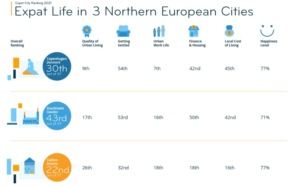News
Expats condemn Copenhagen as one of the world’s worst for local friendliness and feeling welcome – report
This article is more than 4 years old.
Us and them: InterNations study again highlights how internationals find it hard to bond with the Danes

Oslo was spared this time (image: InterNations)
Copenhagen is the fourth hardest city in the world to move to as a foreigner from abroad, according to the 2021 Expat City Ranking, the latest report from InterNations, which this time assesses data collected in 57 global cities.
Broken down into sub-categories, it ranked poorly for Local Friendliness (54), Feeling Welcome (53), and Friends & Socialising (56).
Some 63 percent find it difficult to make new friends, compared to a global average of 32 percent, and 37 percent are unhappy with their social life (25).
A whopping 41 percent describe the local population as generally unfriendly towards foreign residents (18).
Strong showing for urban living and work life
Copenhagen also ranked poorly for the cost of living: finance and housing (42) and the local cost of living (45).
However, strong scores for the quality of urban living (9), urban work life (7) and happiness levels (77 percent) were enough for it to finish mid-table in 30th position overall, 13 places ahead of Stockholm.
The Swedish capital was only slightly better for getting started (53, so fifth worse) and also ranked poorly for finance and housing (50) and the local cost of living (42).
Its happiness level (71) was lower, as were its urban living and work life ratings.
Overall it ranked 43rd, and it ranked last in the sub-category Friends & Socialising.
Plenty to be happy about
Copenhagen still has a winning work-life balance, as 88 percent of expats are satisfied with their working hours (compared to 66 globally), and 82 percent are happy with the balance (66).
Copenhagen ranked first for the sub-category affordability of healthcare, with 86 percent viewing it positively (61).
Public transport (99 vs 69) also got massive approval and the urban environment (85 vs 61).
The weather is a downer with 49 percent regarding it negatively (17),
Six of top eight outside Europe
Six of the top eight cities in the report were all outside Europe.
The top five were Kuala Lumpur, Malaga, Dubai, Sydney and Singapore, and completing the top ten were Ho Chi Minh City, Prague, Mexico City, Basel and Madrid.
Rome finished last, with Milan, Johannesburg, Istanbul, Tokyo, Cairo, Paris, Maastricht, Moscow and New York not far behind.










































